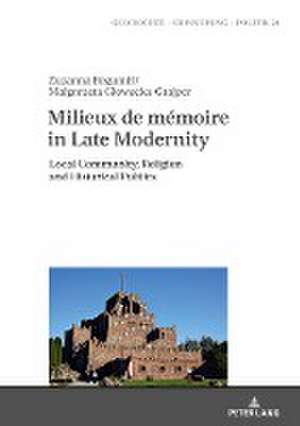Milieux de memoire in Late Modernity: Studies in History, Memory and Politics
Autor Malgorzata Glowacka-Grajperen Limba Engleză Hardback – 24 iun 2019
Preț: 454.19 lei
Preț vechi: 589.86 lei
-23% Nou
Puncte Express: 681
Preț estimativ în valută:
86.94€ • 94.46$ • 73.07£
86.94€ • 94.46$ • 73.07£
Carte tipărită la comandă
Livrare economică 21 aprilie-05 mai
Preluare comenzi: 021 569.72.76
Specificații
ISBN-13: 9783631673003
ISBN-10: 3631673000
Pagini: 298
Dimensiuni: 148 x 210 mm
Greutate: 0.54 kg
Editura: Peter Lang Copyright AG
Seria Studies in History, Memory and Politics
ISBN-10: 3631673000
Pagini: 298
Dimensiuni: 148 x 210 mm
Greutate: 0.54 kg
Editura: Peter Lang Copyright AG
Seria Studies in History, Memory and Politics
Notă biografică
Zuzanna Bogumil is Assistant Professor at the Maria Grzegorzewska University in Warsaw. She works on the religious dimension of memory. Her recent publications focus on representation of the Second World War in Eastern European museums and rediscovery of Russia's repressive past.
Malgorzata Glowacka-Grajper is Assistant Professor at the Institute of Sociology at the University of Warsaw. She has published several articles and books on ethnic minorities in Poland, ethnic identity and social memory in post-Soviet countries.
Malgorzata Glowacka-Grajper is Assistant Professor at the Institute of Sociology at the University of Warsaw. She has published several articles and books on ethnic minorities in Poland, ethnic identity and social memory in post-Soviet countries.
Cuprins
Vernacular memory - Vernacular community - Local community - National site of memory - Local history - Moral capital - Religious framework of memory - Milieux de mémoire - Cultural trauma of local community - Vernacular commemoration - Relationships between ethnic Poles and Polish Jews - Jedwabne - Markowa - Ulma Family - Michniów - Martyrdom - Kalków-Godów - Polish peasants - Historical politics
Descriere
This book shows how vernacular communities commemorate their traumatic experiences of World War II. It draws on four case studies: Kalkow-Godow, Michniow, Jedwabne and Markowa, to argue that it is still possible in the Polish countryside to discover milieux de memoire. The state also uses local histories to bolster its moral capital.












